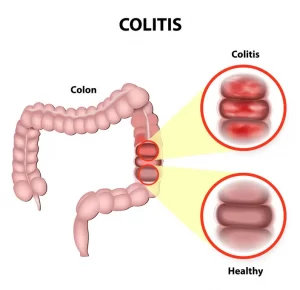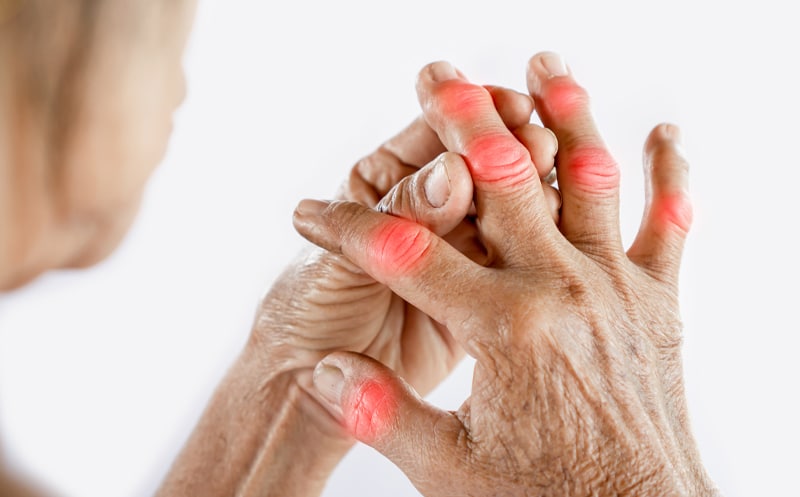Inflammatory Bowel Disease (IBD) is a term for several intestinal inflammation-related diseases. Between 1 and 2 million individuals in the US have IBD. If you have bouts of gut inflammation, diarrhea, constipation, gas, abdominal pain, or bloating, IBD may be to blame. Learn more about IBD symptoms and causes.
What Is Inflammatory Bowel Disease?

Inflammatory Bowel Disease is a chronic digestive condition that causes the intestines to become inflamed, red, and irritated. The two most common IBD disorders are Crohn’s disease and Ulcerative Colitis. Each of these conditions affects different areas of the digestive tract.
- Crohn’s Disease
The inflammation experienced with Crohn’s disease can occur anywhere in the digestive tract – from the mouth to the anus. All layers of the intestinal walls can be affected by Crohn’s disease. Some portions of the intestines can be healthy, while other parts of the intestines can be inflamed.
- Ulcerative Colitis
Ulcerative colitis causes inflammation in the Colon and affects its innermost lining.
Causes of Inflammatory Bowel Disease
There is no definite cause of Inflammatory bowel disease; however, there are several things that can increase your risk of developing IBD.
- Age
On average, most IBD sufferers are diagnosed with a bowel disease before the age of 30; however, some individuals do not develop intestinal inflammation until later in life.
Individuals living in industrialized areas are at an increased risk of IBD. Researchers believe this is because individuals living in urban areas and industrialized countries are prone to eating more processed foods.
- Genetics
If a family member (parent, grandparent, sibling, or child) has been diagnosed with a bowel disease, you are at an increased risk of developing IBD.
- Immune System
The immune system fights off microbes. If it does not function properly, it can attack the digestive system, increasing the risk of inflammatory bowel disease.
- Medications
Medications, including NSAIDs like ibuprofen, diclofenac sodium, and naproxen sodium, can increase the risk of developing IBD as well as worsen the symptoms of those suffering from swollen intestines.
- Race
Although Crohn’s & colitis can occur in any race, Caucasians have an increased risk of developing IBD.
- Sedentary Lifestyle
Leading a sedentary lifestyle can increase the risk of developing IBD.
- Smoking
Cigarette smoking remains one of the most controllable risk factors for inflammatory bowel disease. Smoking cigarettes causes systemic inflammation. Stop smoking to help improve the health of your digestive tract.

Symptoms of IBD
The symptoms of IBD can vary in severity, frequency, and location. The most common symptoms experienced with inflammatory bowel disease include:
- Abdominal Cramping
- Abdominal Pain
- Anal Fissures
- Anemia
- Arthritis
- Bleeding Ulcers
- Blood in Your Stools
- Bloating
- Bowel Obstructions
- Delayed Development
- Diarrhea
- Eye Inflammation
- Fatigue
- Fever
- Reduced Appetite
- Skin Issues
- Ulcers
- Unintentional Weight Loss
- Urgency
Inflammatory Bowel Disease (IBD) Complications
IBD can lead to a variety of complications related to the following:
Bowel Diseases
- Blood Clots – The risk of blood clots increases when you have an irritable bowel disease. These blood clots can occur anywhere in the body.
- Colon Cancer – Your risk of Colon cancer increases if you suffer from intestine inflammation.
- Inflammation – Inflammation of the joints, eyes, or skin can occur, leading to arthritis and skin lesions during an IBD flare.
- Primary Sclerosing Cholangitis – Inflammation within the bile ducts can occur. Over time, this inflammation can lead to narrowing and liver damage.
Crohn’s Disease
- Anal Fissures – Small tears can occur in the lining of the anus or the skin around the anus, causing painful bowel movements or perianal fistulas.
- Bowel Obstructions – Crohn’s disease can inflame the entire intestinal wall. Over time, the bowel wall can become thick and cause a narrowing that can block food and waste. If your bowel becomes obstructed, you may need to have surgery to remove the inflamed and damaged portion of the bowel.
- Fistulas – A fistula can form if the inflammation extends through the entire intestinal wall. Fistulas are abnormal connections that occur between two body parts.
- Malnutrition – Inflammation of the small intestines can make it difficult to absorb the nutrients from your foods. When you experience Crohn’s, you may have low vitamin B12 or iron levels, leading to anemia.
Ulcerative Colitis
- Dehydration – Diarrhea associated with ulcerative colitis can lead to severe dehydration.
- Perforated Colon – A hole can develop in the Colon (perforated Colon) due to inflammation.
- Toxic Megacolon – Ulcerative colitis can inflame the Colon. This inflammation can occur rapidly and cause the Colon to widen and swell.
Holistic Treatment for Inflammatory Bowel Disease
IBD symptoms can vary from person to person. Your functional medicine clinician specializing in digestive disorders focuses on analyzing the root causes of your gut issues. They understand the inner workings of the digestive tract and how food sensitivities, lifestyle choices, and environmental factors can lead to inflammation and disease.
Your gut specialist will develop a customized treatment plan for your IBD symptoms, including pain medications, dietary changes, lifestyle recommendations, and supplements. If you have diarrhea, your doctor may recommend fiber supplements to help bulk your stools. Inflammation of the small intestines may prevent the proper digestion of foods, leading to nutritional deficiencies, which require specific vitamins and minerals to improve gut health.























